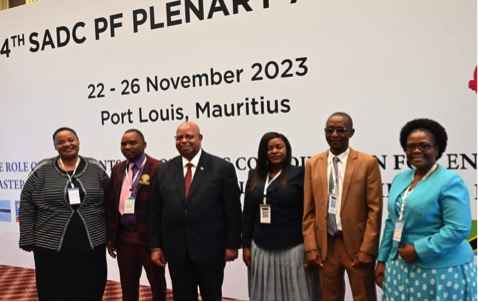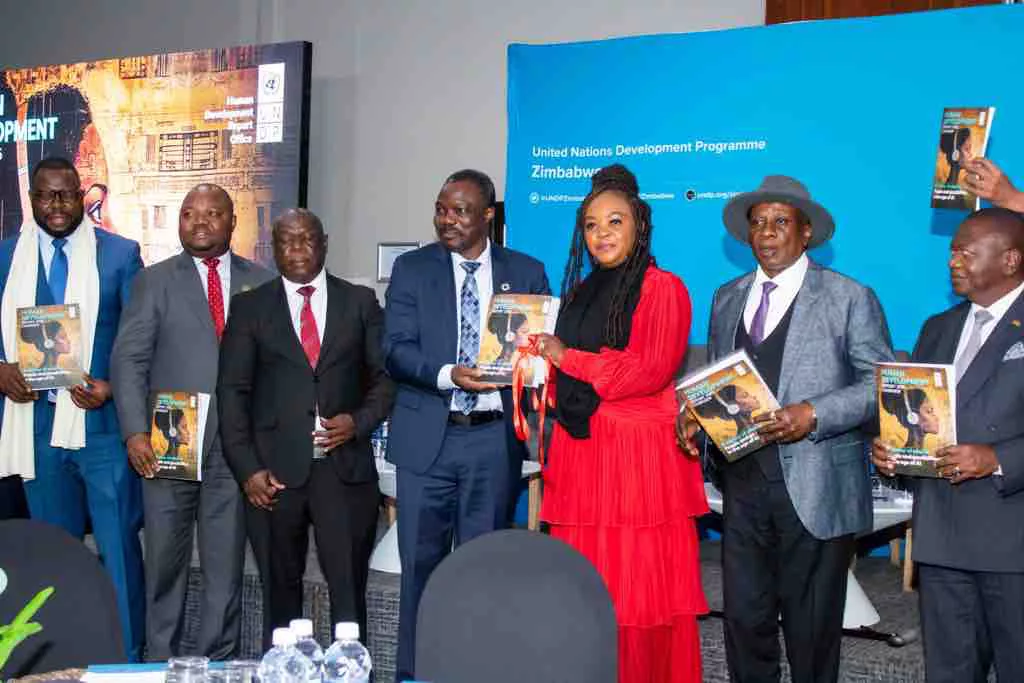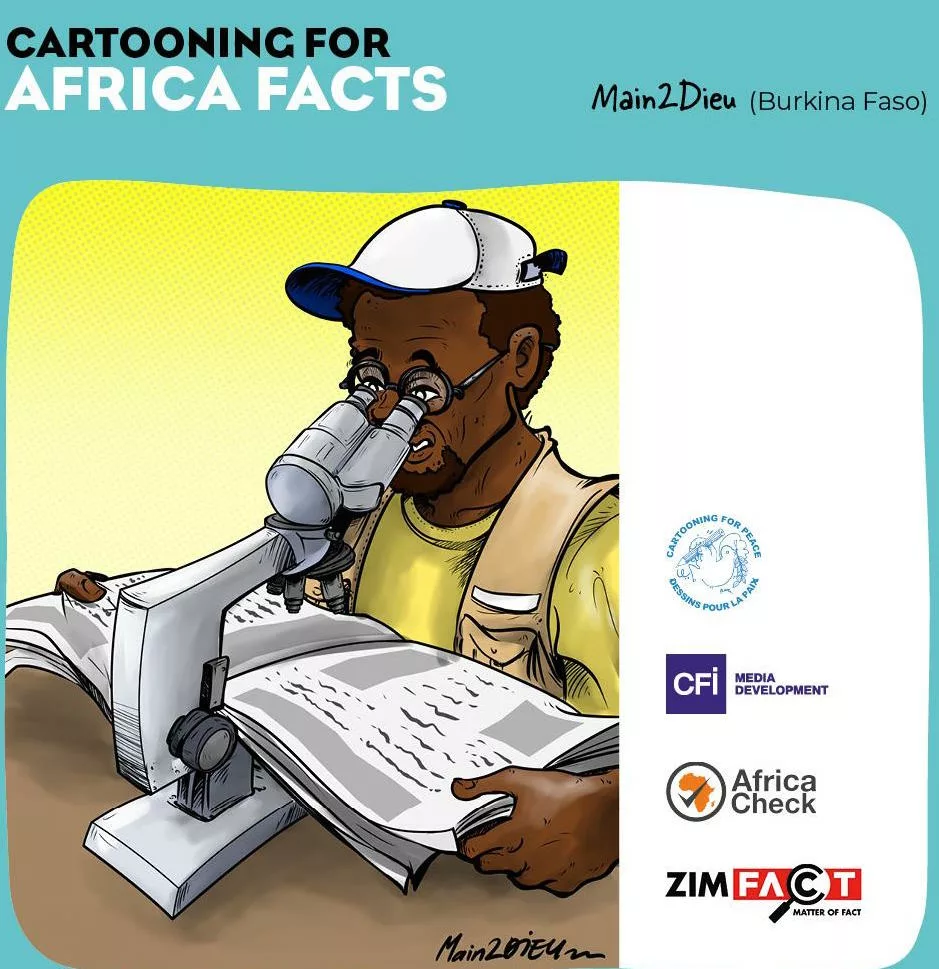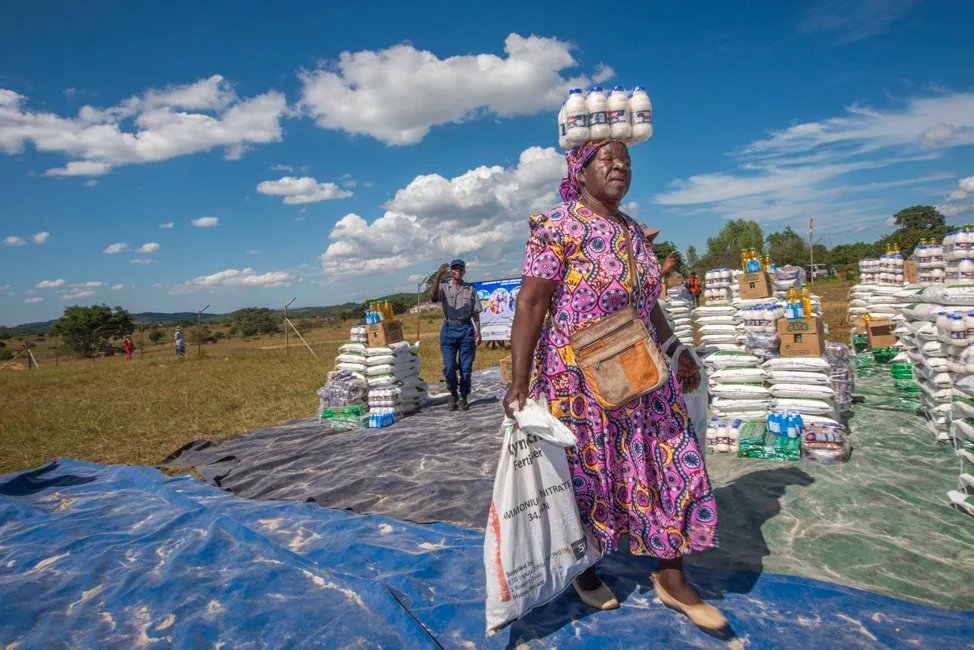|
Getting your Trinity Audio player ready...
|
The 54th Plenary Assembly Session of the SADC Parliamentary Forum was hosted by the Parliament of Mauritius from 22nd to 27th November 2023 under the theme: “The Role of Parliaments in Promoting Coordination for Enhanced Disaster Risk Reduction and recovery planning in the SADC region.”
The meeting ended on a high note on Saturday 26th November with the adoption of several high-impact resolutions that are quintessential to the socio-economic and regional integration of SADC-PF.
The Zimbabwe delegation was led by Hon. Advocate Jacob Francis Nzwidamilimo Mudenda, Speaker of the Parliament of Zimbabwe.
It comprised the following Members of Parliament: Maybe Mbowa, Member of the Standing Committee on Gender Equality, Women Advancement and Youth Development and Chairperson of the Zimbabwe Women’s Parliamentary Caucus (ZWPC); Chinhenza Chigwadzara (Chief Matsiwo), Member of the Standing Committee on Food, Agriculture, Natural Resources and Infrastructure; Tendai Nyabani, Chairperson of the Standing Committee on Democratization, Governance and Human Rights; Mercy Mugomo, Member of the Standing Committee on Trade, Industry, Finance and Investment; and Lynette Karenyi, Member of the Standing Committee on Human and Social Development and Special Programmes.
It is critical to note that Parliamentarians from Zimbabwe, in line with the SADC PF Constitution, took the Oath of Adherence in light of their attendance at the Plenary for the first time. This constitutional requirement as stipulated in Article 8(4) of the SADC-PF Constitution provides that, “Every representative of the Forum shall take an Oath or Affirmation of Adherence to the Forum in such form and manner as may be approved by the Plenary Assembly.”
The 54th Plenary Assembly Session was attended by thirteen (13) of the fifteen (15) Member Parliaments, namely: Angola; Botswana; Democratic Republic of Congo; Lesotho; Malawi; Mozambique; Namibia; Seychelles; South Africa; Tanzania; Zambia; Zimbabwe and the host nation Mauritius. At the same time, 10 Speakers and 5 Deputy Speakers of Parliament were in attendance, as well as 5 Deputy Speakers, as well as 65 MPs from the thirteen Parliaments.
For Mauritius, this marked the third time that the National Assembly of Mauritius had the honour of hosting the Plenary Assembly Session, having previously done so in November 2002 and June 2014. Mauritius, a tourist jewel in the Indian Ocean, is renowned for its multifaceted allure, seamlessly blending of natural flora and fauna, a diverse rich cultural heritage which is the anchor of its booming tourism sector accounting for 40% of the country’s GDP.
The Plenary Assembly extensively deliberated on the theme for the 54th Plenary Assembly Session, guided by the presentations from experts and resource persons in various fields under consideration. These specialists were drawn from the Government Ministries and Departments of the Republic of Mauritius responsible for Disaster Risk Reduction and Management, Meteorological Services, Environment, Solid Waste Management and Climate Change.
Hon. Advocate Jacob Francis Nzwidamilimo Mudenda gave erudite responses to the resolutions adopted during the 53rd Plenary Assembly of the SADC PF as guided by Section 119 of the Zimbabwe Constitution which “empowers Parliament to protect the Constitution by exercising oversight over all Government institutions and agencies at all levels”.
Speaker Mudenda reported that Zimbabwe is now food secure courtesy of the visionary leadership of His Excellency, Cde Dr E.D Mnangagwa, wherein the country recorded a surplus maize harvest of 3, 5 million tonnes and 475 993 tonnes of wheat harvested in 2023. This historic feat is attributed to the country’s embracing of the climate-proofed agriculture commonly known as ‘Pfumvudza/Intwasa’ programme which supports over 1.6 million vulnerable households in maize, sunflower, small grains and soya beans production.
The report informed the SADC PF Plenary that in 2010, Zimbabwe established the Debt Management Office which is under the Ministry of Finance and Investment Promotion for the purpose of effective debt management in order to comply with the SADC debt-to-GDP ratio of no greater than 60% for all Member States. The Public Debt Management Act [Chapter 22.21] (Act 4 of 2015) is the legal framework of the debt management policy. Debt management in Zimbabwe is undergirded by Parliament. The Zimbabwe Anti–Corruption Commission and the Auditor-General’s Office also bolster the effectiveness of public debt management strategies by thoroughly scrutinizing the national Budget expenditure regime for maximum efficacy.
Furthermore, to bolster the implementation of the provisions of the Public Debt Office, Parliament is amending the Public Finance Management Act to incorporate the provisions of the Model Law on Public Financial Management thereby strengthening the effectiveness of the Debt Management Office.
Additionally, in strengthening a “Rights Approach to the Conduct of Business within the Natural Resources Sector in the SADC region”, Zimbabwe has adopted a policy on value addition and beneficiation of its mineral and agricultural resources thereby resulting in downstream mining and agro-industries. The 2024 Pre-Budget Seminar hosted by the Parliament of Zimbabwe implored the Government to accelerate the implementation of the value-addition and beneficiation policies in the mining and agricultural sectors.
The report affirmed that the Parliament of Zimbabwe has a new Thematic Committee on Climate Change to specifically conduct oversight on Government policies, Disaster Risk Reduction (DRR), climate change adaptation and mitigation policies and programmes. Parliament will soon consider the Climate Change Bill which seeks to regulate greenhouse gas emissions and facilitate low-carbon development technologies, including strengthening appropriate institutions and funding mechanisms by working together with the Select Committee on Climate Change.
These two Committees are advocating for the enactment of the Climate Change Bill into law as supported by the Environmental Management Agency (EMA) and the Zimbabwe Environmental Lawyers Association (ZELA) in the same endeavour. It is critical to note that the Plenary Assembly deliberated on ensuring that Member Parliaments embrace efficient waste management, promote renewable energy sources and take measures to further reduce the carbon footprint in their jurisdictions. In this regard, the Zimbabwe Parliament will include climate justice governance in its strategic blueprint to promote green initiatives within the organisation and encourage both Members and Staff of Parliament to proactively be champions in environmental protection actions.
Speaker Mudenda led a delegation to the Second World Summit of the Committees of the Future which was held under the overarching theme- “BRINGING THE FUTURE TO THE PRESENT: THE DEMOCRACY OF THE FUTURE, ARTIFICIAL INTELLIGENCE (AI) AND PARLIAMENTS” reported on the Zimbabwe Parliament’s proactive response to the new technological interventions driven by Artificial Intelligence (AI). Having recognized the fundamental importance of incorporating the application of AI in Parliamentary processes vis-à-vis e-governance which is now prevalent in several developed States, the Parliament of Zimbabwe will establish a “Committee of the Future” to ensure the application of Artificial Intelligence in e-governance. Alive to the negative effects of the use of Artificial Intelligence applications, Parliament will craft a sound legal framework to underpin the ethical use of AI.
In his report, Advocate Mudenda further outlined plans to provide Members of Parliament in the current 10th Parliament with Ipads so that they are ICT compliant. In this regard, all MPs will receive induction on how to effectively harness the ICT apparatus available to them in the dispensation of their Parliamentary responsibilities such as in chat groups amongst themselves and stakeholders in their Constituencies. More fundamentally, Speaker Mudenda reported that H.E Dr. E.D. Mnangagwa President of the Republic of Zimbabwe has established a fully-fledged Ministry of Information Communication Technology, Postal and Courier Services in order to drive the Fourth Industrial Revolution that is anchored on ICT technologies for the whole country against the background of leveraging the application of Artificial Intelligence. This Ministry is headed by a young, vibrant female Minister, Dr. Tatenda Mavetera.
The Plenary Assembly deliberated and resolved various issues arising from Reports submitted by some of SADC PF’s Organs including the Executive Committee, Standing Committees, Regional Women’s Parliamentary Caucus (RWPC) and Regional Parliamentary Model Law Oversight Committee and Members’ Motions. The Plenary Assembly also reflected and made resolutions on various policy, administrative and financial matters, including the transformation of the SADC PF into a fully-fledged Regional Parliament.
Penultimately, the Plenary Assembly commended SADC citizens and stakeholders for their enthusiastic participation in virtual public hearings conducted by SADC PF Standing Committees. The Plenary Assembly also commended public hearings conducted by its Standing Committees and such public hearings should be held annually. It is critical to note that the Plenary applauded the stalwart leadership provided by the Hon. Speaker Advocate Mudenda of Zimbabwe who served in the Inter-Parliamentary Union (IPU) Executive for the past four years, in the process giving timely feedback reports on proceedings of the Inter-Parliamentary body to the SADC and Africa Geo-political groups. Rt. Hon. Nelly B.K Mutti, Speaker of the National Assembly of Zambia, steps into the same critical position having been elected as the incoming Member of the 2023 to 2026 IPU Executive Committee Member, representing the Africa Geopolitical Group as the mould of what Speaker Mudenda had undertaken.
Ultimately, the Plenary Assembly extended its appreciation to the Speaker of the National Assembly and through him, the Government and people of the Republic of Mauritius, for the excellent logistical arrangements resulting in the successful 54th Plenary Assembly Session and for the superlative hospitality extended to all delegates. Delegates envied how Mauritius has carved a niche for itself as a thriving economic hub, focusing itself on education, healthcare and social welfare.
This Indian Ocean nation has made significant strides in improving the quality of life for its citizens. The next Plenary Assembly meeting will take place in Luanda, Angola, in July 2024.






